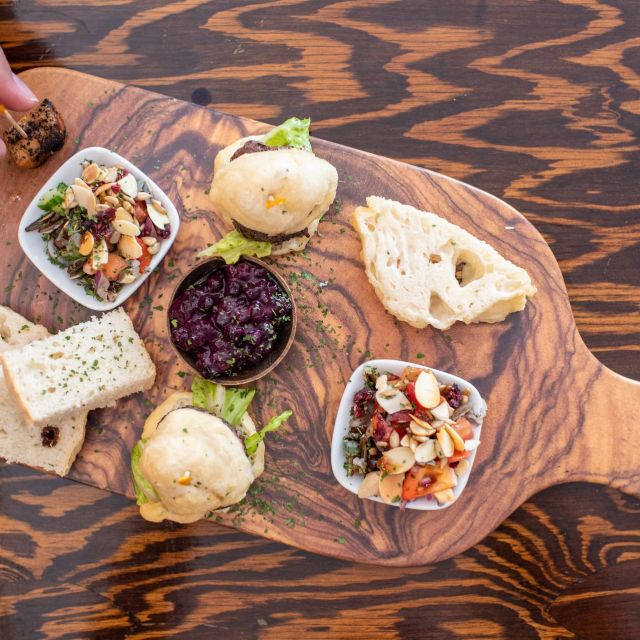Learn about First Nations, Inuit and Métis cultures as you sample and savour these dishes and food products from Indigenous-owned restaurants and makers.
Indigenous cuisine varies depending on where you are in Turtle Island (a name that Indigenous Peoples use for North America). But isn’t that exciting? What you might find on the west coast won’t be the same as what you find in Southern Ontario. So let me help you start—or continue—your Indigenous food journey!
Here are five delicious Indigenous foods you need to try on your next trip to Tkaronto.
Gitanyow wild sockeye salmon at the CN Tower’s 360 Restaurant
The CN Tower 360 Restaurant works with Indigenous chef, David Wolfman from Xaxli’p First Nation in BC, on seasonal three-course Indigenous-cuisine menus.
Summer 2024’s seasonal menu includes cured Gitanyow First Nation wild sockeye salmon with Macerated Saskatoon berries, fried bannock, and sumac crème fraîche. Salmon is eaten by Indigenous Peoples from coast to coast across Turtle Island.
Chef Wolfman’s signature style thrives on putting a modern twist on traditional ingredients.

Bison Burger at Tea-N-Bannock
Now, you might be wondering, “what is bannock?” Bannock is a fluffy, fried bread that dates back to the beginning of the reserve system. This bread was created from items that the Canadian government rationed to Indigenous families on reserve. It takes years of practice, technique, and the grace of Creator to make a wonderfully fluffy piece!
Maybe being the oldest Indigenous food spot in Toronto has something to do with Tea-N-Bannock having some seriously fluffy bannock. This Gerrard Street East restaurant has been around since the spring of 2012.
Tea-N-Bannock has some wonderful options to pair with your fresh-out-of-the-pan bannock. Tea is, of course, a tried-and-true choice. But if you’re looking to satisfy your lunch hunger, I’d suggest a bison burger on a bannock bun.
Served with a side of coleslaw, this burger balances the earthy flavours of the bison with the exciting acidic flavours of pickles and a house-made sauce. Tea-N-Bannock is a judgment-free zone where you can freely experience the stuff-your-mouth yumminess of this burger!
Arctic char and turbot from First Fish
Hungry for sustainably wild-caught fish from the pristine Arctic waters of Nunavut? If your answer is “Yes!” (mine is too), then check out First Fish, a unique non-profit social enterprise. First Fish sources delicious Arctic char and turbot from Inuit fishers in Pangnirtung on the coast of Baffin Island and Rankin Inlet, Nunavut.
First Fish works with Toronto businesses to portion and smoke their harvest, which is found at farmer’s markets and on the menus of top local restaurants, including Tea N Bannock, Cluny Bistro and La Bettola di Terroni.
All of the company’s profits go back into supporting Inuit communities and sustainable fisheries.
Birch Bark Coffee
Headed to Kensington Market? Add a bag or two of Birch Bark Coffee to your shopping list. It makes the perfect souvenir or gift. You can pick it up at Sanagan’s Meat Locker.
This Ottawa/Atlantic Canada-based First Nations roaster produces six unique bean blends, from its mellow Two-Spirit light roast to Indigenous espresso roast. With a focus on Fair Trade partnerships, Birch Bark builds bridges between Indigenous communities here and in the global south, working with small producers to source organic beans for their coffee.
Birch Bark Coffee also uses its platform to advocate for clean drinking water on Indigenous reserves, many of which face substandard water quality.
Wabanaki Maple Syrup
Maple syrup is a fan-favourite in these lands. Its distinctive sweetness pairs well with many foods and can also be used as a substitute for white sugar. Pre-contact, it was used as a tool for healing, and the makers at Wabanaki maple syrup know this well.
Wabanaki is an Indigenous female-owned company located in Neqotkuk (Tobique First Nation) in New Brunswick. They use age-old techniques and blend contemporary ingredients to share oak barrel-aged maple syrup with the people.
And don’t worry: though New Brunswick may be far away, this syrup isn’t. You can find their products at Sanagan’s Meat Locker or at Ecotique in the Roncesvalles neighbourhood.





